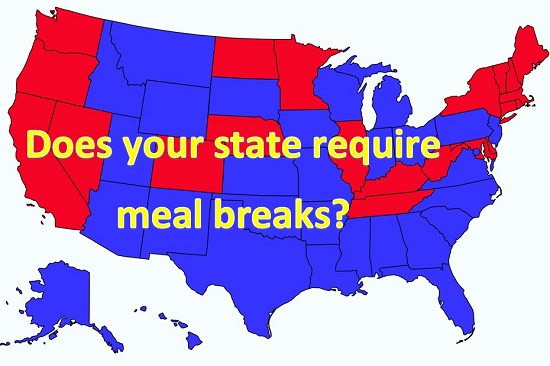Why do you offer breaks to your employees? Is it good for morale? Does it help ensure better quality? Well, for 21 states, if you’re a company operating in the private sector – it may be because it’s required.
Private sector employers in California, Colorado, Connecticut, Delaware, Illinois, Kentucky, Maine, Maryland, Massachusetts, Minnesota, Nebraska, Nevada, New Hampshire, New York, North Dakota, Oregon, Rhode Island, Tennessee, Vermont, Washington, and West Virginia have minimum requirements for meal and/or break periods. While a company may choose to go above and beyond the minimum, the following is important for all employers to make note of, regardless of state requirements:
Track time worked by hourly employees
The actual time “worked” by an employee is a very valuable piece of information as it is used for a variety of calculations and reports. Internally, this figure can be used to determine productivity and efficiency, employee benefit eligibility, leave entitlement, and calculating overtime for payroll purposes. More broadly, this figure is reported in annual OSHA 300(A) logs, and may even be what makes or breaks a company’s worker’s comp rates (as rates take into account payroll dollars). Should the company for any reason be subjected to an audit, employers can most certainly expect to be questioned about “time worked” – given the impact this figure has on a company, and its employees. So, aside from being able to track and comply with break period requirements, an accurate “time worked” figure for hourly employees will be beneficial, legally and financially.
Consider breaks as part of an accommodation
What if an employee is taking more frequent or longer breaks than permitted? Is this a behavioral issue? Should you warn the employee or perhaps dismiss them altogether? Before moving too quickly to judgement, discuss (and of course document) a conversation with the employee. What is his/her reason for deviating from break policies? If it’s due to a medical condition or medical needs of the employee, be prepared for an accommodation discussion. A request for accommodation is not always an obvious or formal interaction. As with most expectation conversations – it’s best to first have a discussion with the employee to understand the reasons behind issues around behavior or performance. A simple accommodation such as an additional or extended break may be a worthwhile step in retaining an exceptional employee as well as avoiding unnecessary, public, legal issues.
Don’t overlook employee morale
What does your policy around breaks say about your company? Does it suggest a company that is concerned about its employees and their well-being? Or, does it suggest a company that offers only what it must? Company culture is not something that is created in a mission statement or on a company website, but collectively by policies, practices, priorities – put together and/or upheld by the company’s leadership. Let your policies reflect the priorities of the company while taking into consideration minimum requirements. Then consider, “is the minimum enough for us”?
Requirements for the 21 states listed above may be found on the US Department of Labor Wage & Hour website. Be sure your policies and practices around breaks and rest period are compliant today.
https://www.dol.gov/whd/
[maxbutton id=”1″ ]
